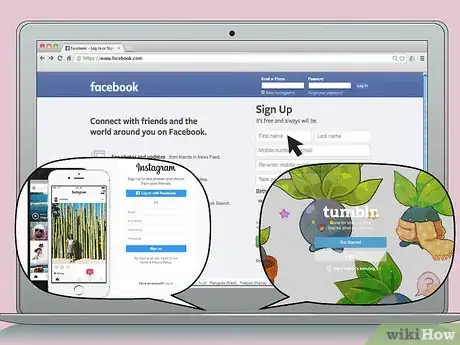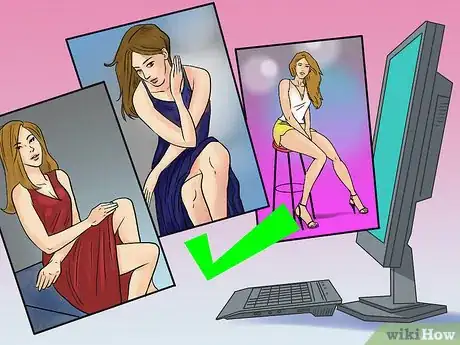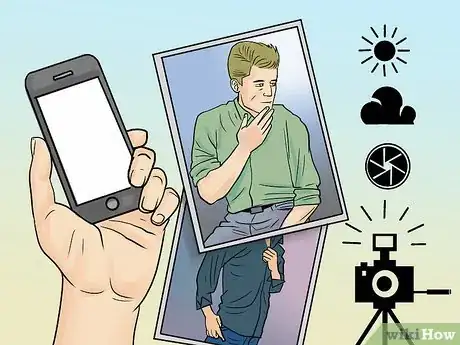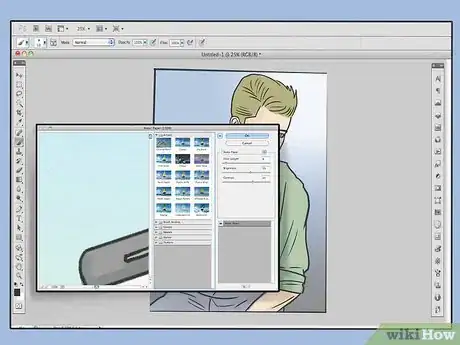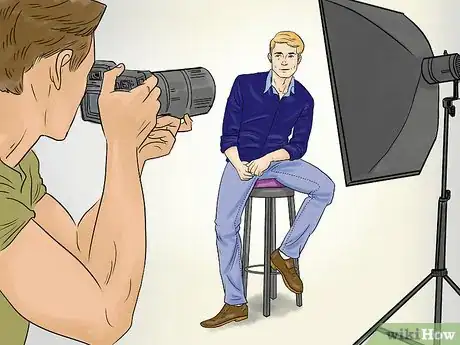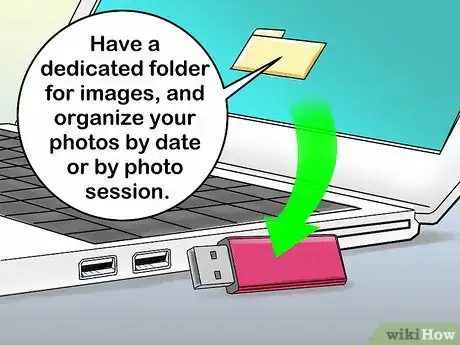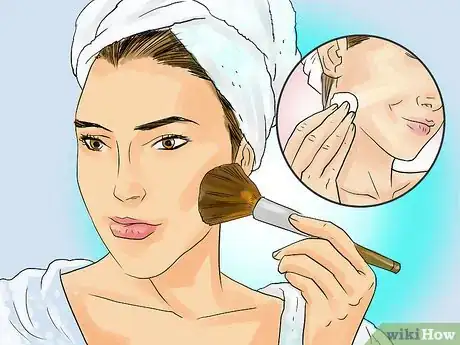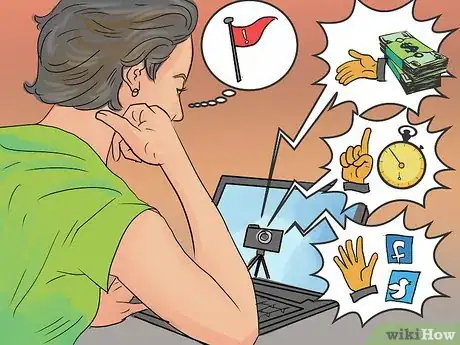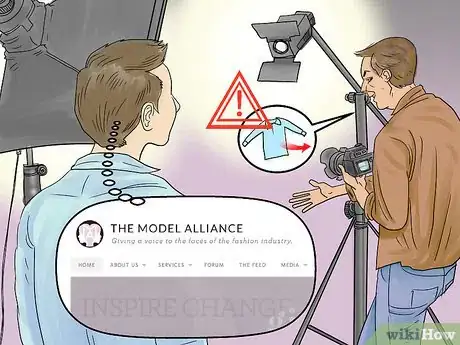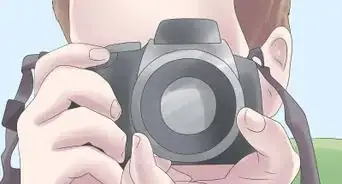This article was co-authored by Traci Halvorson and by wikiHow staff writer, Amber Crain. Traci Halvorson is a Modeling Agent, Former Model, and the Owner of Halvorson Model Management (HMM) in San Jose, California. HMM is a full-service, licensed talent agency representing over 300 professional models and actors. With over 25 years of experience in the modeling industry, Traci specializes in scouting, managing, advising, and launching modeling careers in the Bay Area. Traci holds a BA in Public Relations & Business Management from San Jose State University and also specializes in Marketing, Image consulting, and is a certified Life-Career Coach.
There are 17 references cited in this article, which can be found at the bottom of the page.
This article has been viewed 242,095 times.
Site modeling is when models provide photographs of themselves to be used promotionally on websites and social media platforms. Site models are responsible for getting their own images out there in order to get noticed. Learning how the process works and arming yourself with some helpful tips and pointers will give you a competitive edge, and you can be well on your way to becoming a site model.
Steps
Setting Up Your Online Profiles
-
1Create social media accounts dedicated to site modeling. Currently, the best ones for this are Sitemodel.com, Facebook, Instagram and Tumblr. Set up professional looking accounts and use them only for site modeling. Keep your personal accounts separate. Some site models like to make up entirely new names, or even just last names, to protect their privacy.
- Upload an awesome profile picture to each of your accounts to get you noticed.[1]
- Download all of the corresponding apps to your mobile phone, as well, so that you can interact and upload photos while you're on the go.
- For your own safety, keep personal information to a minimum on your site modeling profiles.
-
2Engage with your followers, friends and fans.[2] When you first start your accounts, be sure to add plenty of friends to get the ball rolling. Definitely add site model agencies. However, avoid adding people randomly and then never interacting with them. Cultivate relationships through these social media platforms and engage with your audience. Spend time commenting on other peoples' posts, photos and etc.
- Once you've got a healthy amount of friends and followers, your visibility will be raised significantly. Friends, fans and followers will start coming to you at that point.
- Be sure to continue interacting with them as much as possible. Think of these interactions as part of your job as a site model.[3]
Advertisement -
3Network with editors and bloggers. Website editors and bloggers are the people on the lookout for site models, so do your homework and find out the names of people associated with some of your favorite sites. Add them as friends and start following them. “Like” and comment on their posts and you'll catch their eye.
- Once you do catch the eye of editors and bloggers, they will start “liking” and commenting on your photos, too.
- Editors and bloggers tend to have large followings on social media platforms, so when they start interacting with you, it will make you more visible to all of their fans and followers.[4]
-
4Avoid uploading a lot of photos that look too similar. For instance, if you took ten pictures of yourself doing the same pose and wearing the same clothes, just add the best one out of the lot. Don't upload all of them.
- Make sure you upload photographs with a variety of different looks, moods, backgrounds and poses.
- Site model agencies are all looking for something different, so uploading visually diverse photos will get you more widespread attention.
Taking Photographs
-
1Aim for quality over quantity. Always take clear, crisp photos and use good lighting. Natural lighting is generally the most flattering, but experiment with other sources.[5] Strive to get the most professional looking shots that you can.[6] Most site models use their cell phones to take the majority of pictures they post online, so take advantage of the countless effects that apps can offer.[7]
- Make sure to take diverse looking photos. Get shots of different angles and looks to maximize your chances of being noticed by a wider variety of agencies, editors and bloggers.
- Never post blurry or amateurish photos on your social media profiles. These will get you noticed for all of the wrong reasons.
-
2Learn to use photo editing software and apps. Photoshop is the industry standard for photo editing, but it's certainly not your only option. GIMP, Adobe Lightroom and Acorn are also great options. Also use photo editor mobile apps so that you have a range of tools at your disposal. Pixl is one of the most popular apps available right now and you can download it for free.[8]
- Experiment with a variety of filters and effects to get a feel for what these programs and apps can do. Less is often more, so use a light touch when editing your pictures.
- Work on getting balanced contrast and brightness in every shot. You don't want your images to look surreal or unnatural.[9]
- Use black and white images occasionally, but stick mainly to color images.
-
3Use a professional photographer to get several quality shots. If you're able to afford a session with a professional photographer, definitely set one up. Aim to get 6 to 12 high quality shots and consider those to be the foundation of your modeling portfolio.[10] Site models don't necessarily need a portfolio in the same way that traditional models do, but it does help to have a few professional shots on hand to send to interested parties.
- Post these professional photos sporadically on your social media profiles.
- The majority of your photos will be done by you (or a friend), but dropping a professional image into the mix every now and then is a great way to get a little extra attention.
-
4Keep your photos organized and dated. Keep your site modeling images separate from everything else on your PC and other devices. Have a dedicated folder for images, and within that folder create additional folders so that you can organize your photos by date or by photo session.
- Rename your finalized photo files so that you can search for them easily.
- Consistently back up your photos by saving them on thumb drives. This is to avoid losing everything if your computer or phone is stolen or crashes.
Looking the Part
-
1Hone your makeup skills. Practice lots of different looks and application techniques until you figure out what works best for you. For a camera-ready look, experiment with high definition foundations – these were created to make people look great on camera.[11] Wear bronzer along your cheekbones to highlight your facial structure. This is called contouring and it looks great on camera.
- Get a good makeup remover so that your face will be spotless after washing up. This will prevent breakouts caused by leftover makeup residue.
- Use oil absorbing sheets in between shots, especially if you have oily skin. These will eliminate shine from your face without messing up your makeup.
-
2Practice posing in front of a mirror.[12] This will help you build confidence and make photo sessions go more smoothly and quickly. You'll learn what does and doesn't work visually and discover what your best angles are by practicing in front of a mirror.
- Try lots of different angles and poses until you have built up a mental catalog of your very best ones. These can be your go-to poses/angles.
- Use your phone to snap some mirror shots, as well, so that you can evaluate how the poses translate as digital images.
-
3Eat a healthy diet and exercise regularly. Healthy food and regular exercise will keep you looking and feeling your best. Eat plenty of fresh fruit and vegetables and increase your water intake to get glowing skin.[13] Sweating during exercise will also help you keep your skin healthy, since it opens your pores and allows dirt and impurities to exit. Cleanse your skin well after you sweat and your skin will look soft and supple.[14]
- Be sure to eat healthy fats found in avocados, nuts, seeds and olive oil. Avoid a completely fat free diet, which isn't good for you.
- Get protein from high-quality sources like fish, shellfish, poultry and tofu.
- Consider taking omega-3 fish oil supplements every day for radiant skin.
-
4Be confident in yourself. Confidence definitely comes across in photographs, so project it as much as possible. Be proud of your look and comfortable with yourself.[15] All kinds of site models are needed, from young people to elderly, and there's no rule that you have to be stick-thin or super tall.
- Agencies, editors and bloggers are looking for real people of all shapes, sizes, races and genders.
- Focus on making yourself look as great as possible in your pictures.
- Don't worry about forcing yourself to conform to preconceived notions of what a model is “supposed” to look like.
Getting Paid
-
1Be aware that site models usually work for free. In most cases, site models do not get paid by websites/blogs for their images. This is because the majority of site model photos are considered to be “candid” – which means they aren't high resolution/professional quality and mostly taken by the site models themselves.[16]
- Most site models simply enjoy taking photos and are happy to provide them at no cost to websites/blogs for the social/online exposure.
- Candid photos are not considered to be copyrighted artwork, so anyone can save and use these photos.
-
2Search for legitimate online modelling communities to join. If you are interested in becoming a professional model, you can use site modelling to get your start in the business. There are online communities and agencies that allow site models to upload their images to be viewed by industry professionals. Modelling agencies, casting directors and photographers sometimes look for new talent through these platforms.
- These community websites usually make money by charging you a monthly membership fee in order to upload your photos and participate.[17]
- Some of them will also require that you pay them a 10% finder's fee if you are discovered for a contract job through their site.
- Be very careful – not all of these agencies are legitimate. There have been reports of sexual assault and even models going missing after showing up to photoshoots set up through them.[18]
-
3Stay alert for possible modelling scams. Unfortunately, the modelling industry is flooded with scams that strive to get money from you without offering any legitimate services. If an agency asks you to pay an upfront fee before they will provide a service, they are not legitimate. Another red flag is if a company requires you to use a specific photographer of their choosing.[19] If you are solicited through an email or Facebook, you are probably being taken advantage of.[20] Never respond if you are asked to send suggestive photos of yourself.
- If you are urged to take an opportunity immediately because it's temporary, it's usually a scam.
- If a deposit is required, which the company claims is refundable, and they only accept cash or money orders – this is a scam.
- Do your research and never give a company your personal information until you confirm their legitimacy.
-
4Watch out for unsafe environments. Never arrange to meet about potential modelling work by yourself or with someone you've never actually met. If you are contacted for a shoot and you feel uncomfortable going to it alone, request to bring someone with you. If the photographer refuses, you may want to reconsider the offer. Anyone under the age of 18 needs to bring a guardian with them to contract jobs. If you are denied that, you should be very concerned.
- If you show up to a shoot and are asked by the photographer to remove your clothing without being told about the nudity initially, leave immediately.
- If you feel you've been taken advantage of in some way, contact The Model Alliance or go to www.modelalliance.org for more information.[21]
- Reputable modeling agencies won't send you to a job that they don't know anything about.[22]
Expert Q&A
-
QuestionIs it dangerous to be a model?
 Traci HalvorsonTraci Halvorson is a Modeling Agent, Former Model, and the Owner of Halvorson Model Management (HMM) in San Jose, California. HMM is a full-service, licensed talent agency representing over 300 professional models and actors. With over 25 years of experience in the modeling industry, Traci specializes in scouting, managing, advising, and launching modeling careers in the Bay Area. Traci holds a BA in Public Relations & Business Management from San Jose State University and also specializes in Marketing, Image consulting, and is a certified Life-Career Coach.
Traci HalvorsonTraci Halvorson is a Modeling Agent, Former Model, and the Owner of Halvorson Model Management (HMM) in San Jose, California. HMM is a full-service, licensed talent agency representing over 300 professional models and actors. With over 25 years of experience in the modeling industry, Traci specializes in scouting, managing, advising, and launching modeling careers in the Bay Area. Traci holds a BA in Public Relations & Business Management from San Jose State University and also specializes in Marketing, Image consulting, and is a certified Life-Career Coach.
Modeling Agent Not if you're working with an agency. For instance, an agency won't assign a model to a job if they don't know any details about it. The modeling agency receives all the information up front, and the model accepts the shoot, signs off on it, and goes to the job.
Not if you're working with an agency. For instance, an agency won't assign a model to a job if they don't know any details about it. The modeling agency receives all the information up front, and the model accepts the shoot, signs off on it, and goes to the job.
References
- ↑ http://www.thefashionspot.com/life/178483-how-to-become-really-popular-on-instagram/
- ↑ http://www.thefashionspot.com/life/178483-how-to-become-really-popular-on-instagram/
- ↑ http://www.elle.com/life-love/a31020/how-to-become-an-instagram-celebrity/
- ↑ http://www.thefashionspot.com/life/178483-how-to-become-really-popular-on-instagram/
- ↑ http://www.huffingtonpost.com/entry/instagram-hacks-from-people-who-take-really-good-photos_us_563a8148e4b0411d306f8393
- ↑ http://www.modelmanagement.com/modeling-advice/modeling-portfolios/
- ↑ http://www.elle.com/life-love/a31020/how-to-become-an-instagram-celebrity/
- ↑ http://www.creativebloq.com/software/best-photo-editor-51411752
- ↑ http://www.huffingtonpost.com/entry/instagram-hacks-from-people-who-take-really-good-photos_us_563a8148e4b0411d306f8393
- ↑ http://www.modelmanagement.com/modeling-advice/modeling-portfolios/
- ↑ http://www.cosmopolitan.com/style-beauty/beauty/advice/g1591/makeup-to-look-good-in-pictures/?slide=3
- ↑ http://www.marieclaire.com/celebrity/project-runway/how-to/g861/look-good-in-photos/?slide=1
- ↑ http://www.brides.com/blogs/aisle-say/2014/03/how-to-get-glowing-skin-wedding.html
- ↑ http://www.fitday.com/fitness-articles/fitness/exercises/sweating-why-its-good-for-you.html
- ↑ http://www.marieclaire.com/celebrity/project-runway/how-to/g861/look-good-in-photos/?slide=3
- ↑ http://brokendollmodels.com/modeling/how_to_become_a_model.php
- ↑ http://www.onemodelplace.com/content/membership-models.html
- ↑ http://modelalliance.org/modeling-scams
- ↑ https://www.consumer.ftc.gov/articles/0071-look-out-modeling-scams
- ↑ http://modelalliance.org/modeling-scams
- ↑ http://modelalliance.org/
- ↑ Traci Halvorson. Modeling Agent. Expert Interview. 17 June 2021.
